#medienmacher
Text

Huch, wie konnte diese leicht anrüchige Szene nur in den Zeichentrickfilm gelangen?
Tja, das nennt man "Fetish Fuel". Medienmacher setzen deine Neigung bewusst für Klick, Quote & Co. ein. Schon gewusst?
10 notes
·
View notes
Text
Die Verdummung der Deutschen
An alle Deutschen, an alle Mitglieder des Bundestages und an alle Medienmacher, TV-Sender und Journalisten habe ich eine Frage: Habe ich das jetzt richtig verstanden?
Wenn meine Bäckerei keine Produkte mehr verkaufen kann, bin ich nicht automatisch Insolvent, ich höre blöß auf Geld zu verdienen?
Wenn ich durch gesetzliche Verpflichtung zu einer Impfung gezwungen werde, lasse ich mich ja dann doch freiwillig impfen?
Wenn ich im Alltag Strom spare, spare ich zwar nicht auf dem Strohmzähler, dafür aber Ressourcen?
Wenn ich mich impfen lasse, kann ich zwar Corona kriegen und Weitergeben, schütze aber trotzdem mich und andere?
Wen wollt ihr hier eigentlich verarschen?
#deutschland#politik#robert habeck#karl lauterbach#klabauterbach#deutsch#deutsche blogs#wahrheit#pandemie#plandemie#corona#covid 19#germany#medien#fernsehen
6 notes
·
View notes
Text
Diskussion: Alternative Medien als fünfte Gewalt?
Info-direkt:»Am vergangenen Freitag veranstaltete die Burschenschaft „Eysn zu Steyr“ im Schloss Lamberg in Steyr einen Diskussionsabend zum Thema „Alternative Medien – Die fünfte Gewalt: Notwendiger denn je?“ Als Referenten waren folgende alternative Medienmacher eingeladen: Walter [...]
Der Beitrag Diskussion: Alternative Medien als fünfte Gewalt? erschien zuerst auf Info-DIREKT. http://dlvr.it/T60wX0 «
0 notes
Text
1 note
·
View note
Text
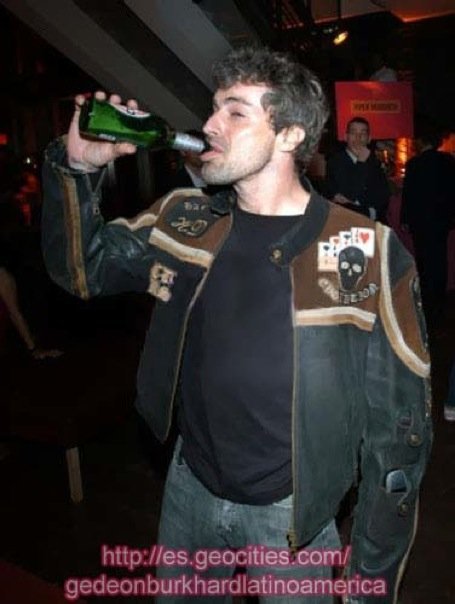
Copyright : Eventpress / Krohn Datum : 01.09.2005
Thema : "Absolut Berlin, die Nacht der Berliner Medienmacher" im Cafe Moskau in Berlin.
Mit den Gaesten : Gideon Burkhardt
1 note
·
View note
Text
Sprachpolizei
Wer sehen will wie die Sprachpolizei arbeitet der sollte auf ihre Webseite gehen. Sie nennt sich natürlich nicht Sprachpolizei sondern Wörterverzeichnis der neuen deutschen Medienmacher*innen (NdM). Die Sprachpolizei ist gut drin setze und Wörter umzuschreiben. Aber das ändert nichts an ihren autoritären Anspruch und Stil.
0 notes
Text
0 notes
Text
0 notes
Text
Moderatorin erzählt: Wie Wolfgang Fellner sie sexuell belästigt haben soll
Moderatorin erzählt: Wie Wolfgang Fellner sie sexuell belästigt haben soll
Nora Kahn spricht im Podcast über Vorwürfe sexueller Belästigung gegen Medienmacher Wolfgang Fellner. Dieser bestreitet. Welche Rolle spielen Ibiza, Bayern und ein Boot?
Diese Nachricht wird übernommen. Nach dem rumänischen Gesetz Nr. 8/1996 können die Nachrichten ohne das Herz der Eigentümer übernommen werden.
Leontiuc Marius

View On WordPress
0 notes
Text
Claudia Roth: 2,3 Millionen Euro Steuergeld für linke Medien
0 notes
Photo
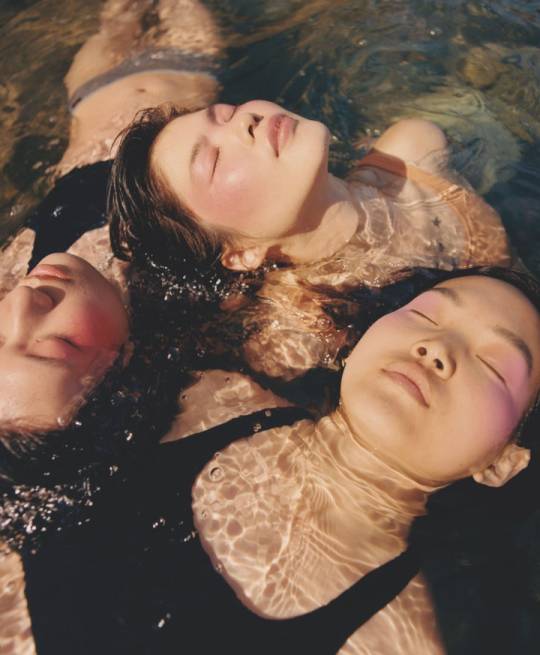
C/O Berlin Magazine | It’s a space for everyone, and everyone can come in — Thoughts for the future
“I cringe when I hear words like ‘diversity’ and ‘inclusion.” To quote the civil rights activist, philosopher, and writer Angela Davis, “diversity” and “inclusion” are terms that you, dear reader, might have also stumbled across in recent months, whether you wanted to or not. Inspired by global Black Lives Matter protests, mainstream media, corporations, and other institutions finally realized – in some cases as it seems overnight – that racism is also an intractable problem in Germany. Unfortunately, we need more than just hollow words and empty promises to solve this problem. You might be thinking to yourself: “But didn’t people take to the streets or write opinion pieces in newspapers to protest structural racism? And didn’t major institutions promise to offer diversity and inclusion workshops in discussion after discussion on television?” Perhaps, but don’t be fooled. Instead of critically questioning the role that white decision-makers play in perpetuating systemic racism, “society” was blamed. Over and over again, Black* people were asked to answer if they had really experienced racism through scrutiny of their real-life stories, while predominantly white “experts” were invited onto talk shows to discuss the so-called “racism debate”. Profound, structural changes are still lacking, at least as of the time this text goes to print.
Presence equals power. This brings us to the current moment where you are reading these words about British photographer Nadine Ijewere’s solo show at C/O Berlin. Nadine Ijewere is the first Black woman to be given a space that has previously been occupied almost exclusively by white men. As such, this exhibition is significant not only for Black photographers, but for everyone more used to being treated as the object than the artist or curator in spaces like this where many people don’t feel welcome or simply don’t exist. As trivial as it may sound, visibility comes from being able to hang pictures on a wall—or write these lines.
Joy as an act of resistance. Nadine Ijewere belongs to a generation of artists and creatives who have realized that there are more options than simply following the traditional path. Knowing that society has long since changed—even if many gatekeepers in fashion, art, and the media still cling to the status quo—this DIY generation is creating its own platforms to elevate their own role models with an army of loyal followers. In their work, representatives of this generation create worlds that rarely center Eurocentric beauty norms. The same goes for this young British artist, whose work shows people in all their beauty and uniqueness. Her photographs regularly appear on the pages of British, American and Italian Vogue, i-D, or Garage, and she has collaborated with brands such as Nina Ricci and Stella McCartney. Ijewere proves that beauty is multifaceted and that fashion is fun and for everyone.
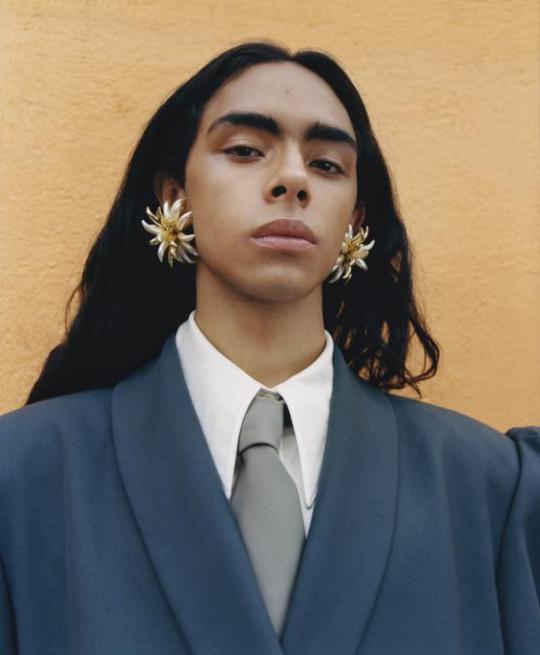
More than a seat at the table. When artists like Ijewere make it to the top, it’s not because of nepotism, tokenism, or diversity as a trend, but despite all the obstacles that have been put in their way. And instead of assimilating after being accepted by the old guard, they continue to write their own rules. In Ijewere’s case, this means not only working with diverse models and teams, but also passing her knowledge on as a mentor to keep the proverbial door open. She’s less driven by the desire to stand out from the mainstream than she is to give back by inspiring younger generations, who are able to see themselves in magazines. “Within the time I have, I’ll use every opportunity I get and every space I can get into to expand the horizon of others.”
Representation matters. Celebrating Black people and people of color in a traditionally white space was also the goal of “Visibility is key – #RepresentationMatters,” a watershed moment for the German lifestyle magazine industry when it launched on vogue.de in spring 2019. The goal was to take first steps toward a forward-thinking future where inclusion and diversity would no longer be mere buzzwords, but lived practices. Part of that effort meant ensuring representation in front of as well as behind the camera. The results weren’t perfect and they might not have led to social change, but we proved that there isn’t a lack of creative talent among Black and Brown people in Germany. If anything, we proved that these talents are often denied the space to develop their full potential.
Ideas for the future. As you see, dear reader, it takes teamwork to bring about long-term change, and for the first time the doors are open a bit. Nadine Ijewere's exhibition shows this, as does being able to write these very words in the C/O Berlin Newspaper. In the statements below, we asked German and international artists and creatives to envision a future where representation and inclusion are lived practices instead of rare exceptions. The results are ideas for a future that is reachable—as long as we all keep working towards it every day. Together.
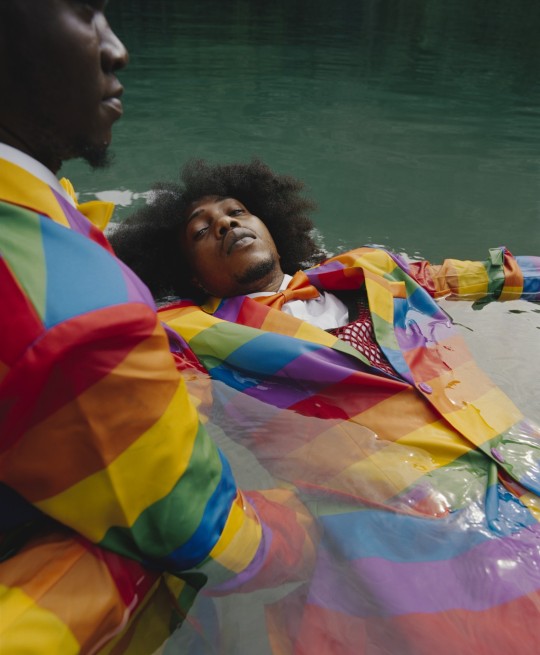
Nadine Ijewere, artist
Art is about art. It’s not about you personally. That’s why artists need to be seen as artists. We all get stereotyped and put into the same box—but we have our own identity. We are put into the same space just because we are Black, but we are all very different people.
Edward Enninful, OBE, Editor-in-Chief of British Vogue
Nadine is one of the leading fashion photographers of her generation. She’s not only inherently British in her work, she’s also Black British. She really understands the complex mix of culture, fashion, beauty, and the inner working of a woman, so when you see her images, it’s never just a photograph. There’s also a story and a narrative behind it.
Benjamin Alexander Huseby & Serhat Işık, designers for the label GmbH
Our work has always been about wanting to show our community and culture to tell our stories as authentically as we can. It was never about “diversity”, but about being seen. We want to create a world where not only exceptional Black and Brown talents no longer have to be truly exceptional to get recognition for their work, a world where we no longer are the only non-white person in the room because we built the motherfucking house ourselves.
Mohamed Amjahid, freelance journalist and author, whose book Der weiße Fleck will be published by Piper Verlag on March 1, 2021.
It's time that Black women become bosses. Gay Arabs should get to call the shots. Refugees belong on the executive boards of big corporations. Children of so-called “guest workers” should move into management positions too. People with disabilities should not just have a say, they should make the decisions. Vulnerable groups deserve to put their talents and ideas to work in the service of the whole society. Not every person of color is automatically a good leader by virtue of their background, but all-white, cis-male executive boards are certainly incapable of making decisions that are right for everyone. That’s why we need more representation at the very top, where the decisions are made.
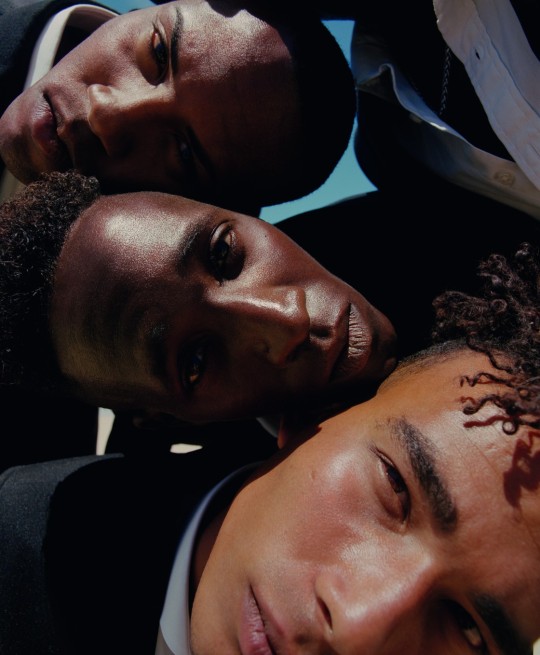
Melisa Karakuş, founder of renk., the first German-Turkish magazine
For a better future, I demand that we educate our children to be anti-racist and to resist when others or when they themselves are subjected to racism. I demand that discrimination is understood through the lens of intersectionality and solidarity! I demand that even those who are not affected by racism stand up against it! This fight is not one that we as Black people and people of color fight alone—for a better future, we all have to work together.
Tarik Tesfu, host of shows including the NDR talk show deep und deutlich
When I look in the mirror, I see someone who grew up in the Ruhr region and loves currywurst with French fries as much as Whitney Houston. I see a person who has his pros and cons and who is so much more than his skin color. I see a subject. But the German media and cultural system seem to see it differently because far too often, Black people are degraded and made into objects for the reproduction of racist bullshit. I'm tired of explaining racism to Annette and Thomas because I really have better things to do (for example, my job). So get out of my light and let me shine.
Ronan Mckenzie, photographer
The future of our industry needs to be one with more consideration for those that are within it. One that isn’t shrouded in burnout and the stresses of late payments, and one that doesn’t make anyone question whether they have been booked for the quality of their work or to be tokenized for the color of their skin. The future of our industry needs to go beyond the performative Instagram posts and mean-nothing awards, to truly sharing resources and lifting up one another. Our industry needs to put its money where its mouth is when words like “support”, “community” or “diversity” slip out, instead of using buzzwords that create an illusion of championing us. How there can be so much money in this industry yet so many struggle to keep up with their rent, feed themselves, or just rest without worrying about money is truly a travesty. If this industry is to survive then we who make it what it is need to be able to thrive.
Ferda Ataman, journalist and chair of Neue deutsche Medienmacher*innen
A recent survey of the country's most important editors-in-chief revealed that many of them think diversity is good, but they don't want to do anything about it. This is based on the assumption that everyone good will succeed. Unfortunately, that’s not true. It’s not just a person’s qualifications that are decisive, but other criteria as well, such as similarity and habit (“XY fits in with us”). It's high time that all of us—everywhere—demand a serious commitment to openness and diversity. Something is seriously wrong in pure white spaces that can’t be explained by people’s professional qualifications alone. Or to put it differently: a good diversity strategy always has an anti-racist effect.
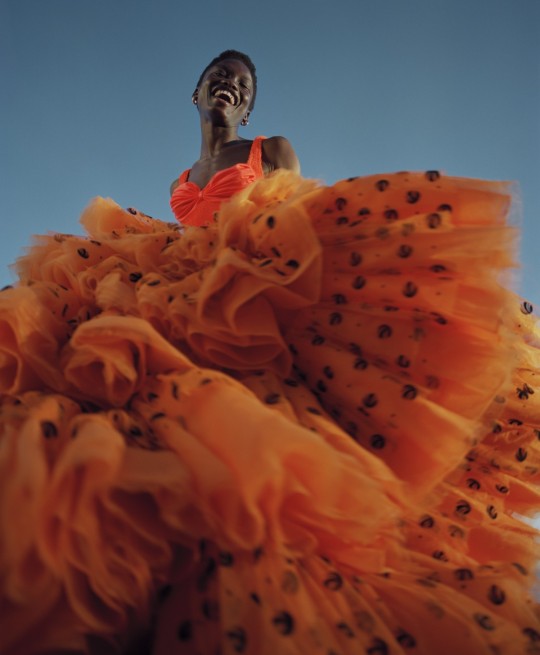
Nana Addison, founder of CURL CON and CURL Agency
Being sustainable and inclusive means thinking about all skin tones, all hair textures, and all body shapes—in the beauty industry, in marketing communications, as well as in the media landscape. These three industries work hand in hand in shaping people’s perceptions of themselves and others. It’s important to take responsibility and be proactive and progressive to ensure inclusivity.
Dogukan Nesanir, stylist
The current system is not designed to help minorities. By giving advantages to certain people and groups, it automatically deprives others of the chance to attain certain positions in the first place. That's why I don't even ask myself the question "What if?" anymore. My work is not about advancing a fake worldview, but about highlighting all the real in the good and the bad. I strongly believe that if some powerful gatekeepers gave in, if representation and diversity happened behind the scenes and we had the chance to show what the world REALLY looks like, we wouldn't be having these discussions at all. I don't just want an invitation to the table, I want to own the table and change things.
Arpana Aischa Berndt & Raquel Dukpa, editors of the catalog I See You – Thoughts on the Film “Futur drei”
In the German film and television industry, production teams and casting directors are increasingly looking for a “diverse” cast. Casting calls are almost exclusively formulated by white people who profit from telling stories of people of color and Black people by using them, but without changing their own structures in the process. Application requirements and selection processes in film schools even shut out marginalized people by denying them the opportunities that come with being in these institutions. People of color and migrants as well as Black, indigenous, Jewish, queer, and disabled people can all tell stories, too. Production companies need to understand that expertise doesn’t necessarily come with a film degree.
Vanessa Vu & Minh Thu Tran, hosts of the podcast Rice and Shine
It may be convenient to ignore entire groups, but we are and have been so much more for a very long time. We contribute to culture by making films or plays and bring new perspectives to science, politics, and journalism. We’re Olympic athletes, curators, artists, singers, dancers, and inventors. We dazzle and shine despite not always being seen. Because we have each other and we’ve created opportunities to do the things we love. We’ve created platforms for each other and built communities. Slowly but surely we are finally getting applause and recognition for the fact that we exist. That's nice. But what we really need is not just the opportunity to exist, but the opportunity to continue to grow and to stop basing our work primarily on self-exploitation. We need security, reliability, and money. That's the hard currency of recognition. That would mean being truly seen.
*Black is a political self-designation and is capitalized to indicate that being Black is about connectedness due to shared experiences of racism.
Written by: Alexandra Bondi de Antoni & Kemi Fatoba
C/O Berlin Magazine April 2021
36 notes
·
View notes
Text

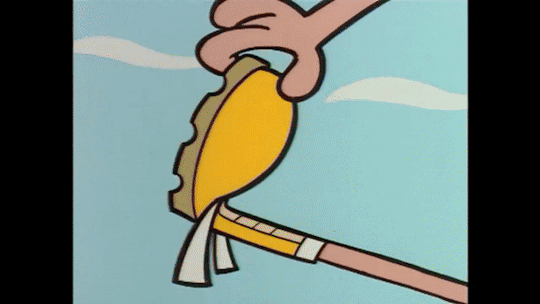
"Also ich habe keine Ahnung, wie das Kind einen Fußfetisch entwickeln konnte!"
LOL.
Erfahre hier, wie Medienmacher deinen Fetisch ganz bewusst einsetzen
6 notes
·
View notes
Photo




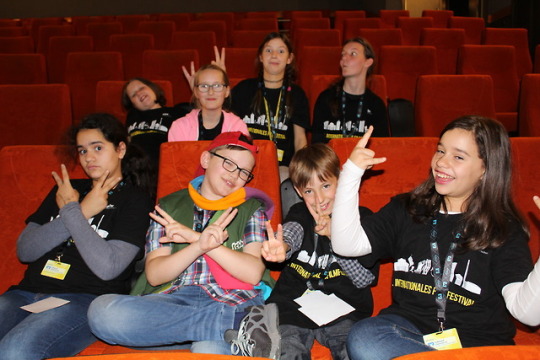
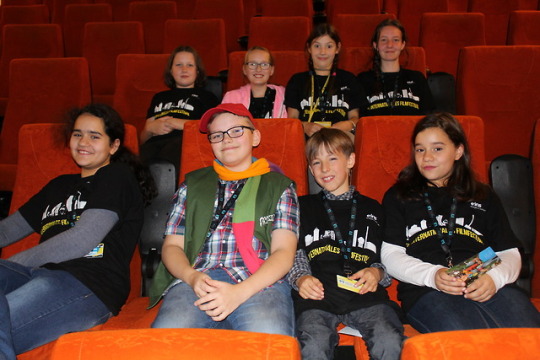
Auf in die letzte Runde: Die Schlingel-Reporter bearbeiteten heute ihre Interviews und stellten einen Highlight-Clip für die morgige Preisverleihung zusammen. Ebenso stand ein Interview mit der Kinderjury des Festivals auf dem Plan.
Wir hatten sehr viel Spaß und nehmen uns viel mit. Den Umgang mit Kamera und Technik, das selbstbewusste Auftreten vor Publikum und wir freuen uns, dass wir die Möglichkeit hatten, einige Regisseure, Produzenten und Schauspieler persönlich zu treffen.
Danke an das Team des SAEK und des Schlingel Festivals für eine wunderschöne Woche!
#saekchemnitz#saek#iffschlingel#schlingelreporter#schlingel2018#wasmitmedien#medienprojekt#medienmacher
0 notes
Text
Sein eigener Banker werden
Manova: »Die Banken wanken. In jeder Hinsicht. Das kleine Bankenbeben von 2023 könnte ein Menetekel für einen baldigen und globalen Dominoeffekt der Bankenkollapse gewesen sein. Es ist mächtig Druck im Kredit-Kessel, und es braucht nun wirklich nicht mehr viel, bis dieser hochgeht. Das Bankensystem und alle davon abhängigen Teilsysteme der Gesellschaft stehen unter Spannung. Entsprechend trachtet das Konglomerat aus Politik, Medien, NGOs und Finanzwesen danach, die narrative Deutungshoheit über den absehbaren Systemzerfall zu behalten. Da sind freie und alternative Medien Sand im Getriebe. Gegen diesen geht das System jetzt mit einem zerstörerischen Dampfstrahl vor, indem systemkritischen Medien reihenweise die Bankkonten gekündigt werden. Damit legt das System die Axt an die Wurzeln der Finanzierung dieser Presseorgane. Der Verlust des Bankkontos ist existenzbedrohend — oder er war es! Denn mittlerweile stehen jedem Menschen die technischen Möglichkeiten zur Verfügung, sich vom Banksystem unabhängig zu machen, wie der Medienmacher Kayvan Soufi-Siavash im Manova-Exklusivgespräch erklärt. http://dlvr.it/T5x129 «
0 notes
Photo

Heute haben wir beim #autor_innensonntag von @justine_thereadingmermaid das Thema: Autor_innen gegen Rechts - ein gewaltiges Thema. Unweigerlich bin ich nicht nur auf das Wort „rechts“ gestoßen, sondern auch „rechtsextrem“ und „rechtsradikal“, als ich mich mit dem Thema beschäftigt habe. Die schlimmste rechtsextreme Diktatur ging von Deutschland aus und hallt bis heute nach. Was tun Autor_innen gegen Rechts? Da gibt es, z. B. die Online-Petition „Unsere Antwort für Demokratie und Menschenrechte“- Unterzeichner sind Künstler, Autoren und Medienmacher. Dann gibt es „Worte gegen Rechts“ auf der LBM oder „Stimmen gegen Rechts“ oder Benefizlesungen „Autoren gegen Rechts“. Es gibt auch Literatur gegen Rechts- die Klassiker, wie z. B. Von Klaus Mann „Mephisto“, Hans Fallada „Kleiner Mann, was nun“, aber auch von Jörg- Uwe Albig „Zornfried“, von Sandra Gugic „Protokoll der Gegenwart“ oder von Manja Präkels „Als ich mit Hitler Schnapskirschen aß“, um nur einigen zu nennen. Wie geht ihr mit diesem Thema um? 🤔 #bookstagram #bookstagramgermany #schreibcommunity #schreibtipp #buchblogger #booklover #bookblogger #bücherliebeverbindet #book #bookworm #autorinkatrinlachmann #bücherliebe https://www.instagram.com/p/CdAlU2tOsjV/?igshid=NGJjMDIxMWI=
#autor_innensonntag#bookstagram#bookstagramgermany#schreibcommunity#schreibtipp#buchblogger#booklover#bookblogger#bücherliebeverbindet#book#bookworm#autorinkatrinlachmann#bücherliebe
0 notes
Photo
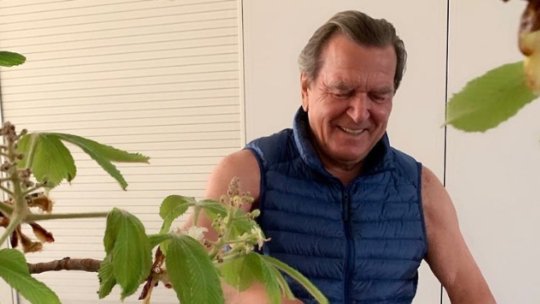
Sonntag, 02. Januar 2022 "Macht euren Kram" Schröder kontert Lacher über Bratpfannen-Foto Für ein Foto am Herd, das seine Ehefrau Soyeon auf ihrem Instagram-Account postet, erntet Gerhard Schröder jede Menge Lacher in den sozialen Medien. Auf den Spott reagiert der Altkanzler nun in einem Interview. An seine Hater macht er eine klare Ansage. Zuverlässig hält Soyeon Schröder-Kim ihre 33.500 Follower auf Instagram über ihre privaten und beruflichen Aktivitäten auf dem Laufenden - mal mit, mal ohne ihren Ehemann Altkanzler Gerhard Schröder. Zuletzt postete sie ein Silvesterfoto, auf dem die beiden in "Dinner for One"-Manier ein elegantes "Dinner for Two" zelebrieren. Der Post davor zeigte das Ehepaar glücklich und entspannt in einer verschneiten Landschaft. Doch es geht auch noch privater. Im Mai 2020 postete Schröder-Kim ein Foto von ihrem Ehemann auf Instagram, das viele amüsierte. Auf dem Foto steht der Altkanzler in ärmelloser Weste am Herd und hantiert mit einer Bratpfanne. Schröder-Kims Kommentar damals dazu: "Der Moderator fragte mich, ob mein Mann zu Hause auch Bundeskanzler sei. Das Foto erklärt, souverän ist er immer noch, aber zu Hause eher an der Bratpfanne." In einem neuen Interview mit dem Branchenblog für Medienmacher "Turi2" wurde Gerhard Schröder nun darauf angesprochen, ob solche Bilder von ihm möglicherweise "zu trashig" seien. "Denen sage ich: Leute, das ist mein Leben und nicht eures. Ich mache, was ich für richtig halte, und ihr macht euren Kram", konterte er. "Menschen wollen von den Politikern ja nicht nur politische Statements hören, sie wollen auch mal wissen: Was macht der sonst so? Und das finde ich in einer Demokratie nicht falsch", erklärte er weiter. Soyeon Schröder-Kim und Gerhard Schröder sind seit 2018 verheiratet. Für ihn ist es die fünfte Ehe, für sie die zweite. Schröder war von 1998 bis 2005 Bundeskanzler der Bundesrepublik Deutschland und machte sich unter anderem als "Basta-Kanzler", der auch mal ein Machtwort spricht, einen Namen.
0 notes